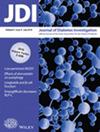Research on the characteristics of gut microbiota in overweight patients with early-onset type 2 diabetes mellitus
Abstract
Background
Early-onset type 2 diabetes mellitus (EOD), defined as a metabolic disorder diagnosed before the age of 40, with higher risks of complications, vascular events, and mortality, poses a significant threat to public health. Its prevalence has risen markedly in overweight populations in recent years, yet the underlying mechanisms remain elusive. Emerging evidence highlights a close association between gut microbiota (GM) and metabolic disorders, suggesting that modulating gut microbial dysbiosis may serve as a potential strategy for preventing and managing overweight EOD.
Methods
In this study, we enrolled 30 overweight EOD patients and 30 healthy controls, analyzing their GM profiles and correlations using physicochemical clinical parameters and fecal metabolites.
Results
The results demonstrated significant differences in GM composition between overweight EOD patients and healthy controls. EOD patients exhibited increased the ratio of Firmicutes/Bacteroidetes at the phylum level. At the genus level, Bilophila, Serratia, Lachnospira, and Parabacteroides were enriched in EOD patients, while taxa, such as Faecalibacterium, Ruminococcaceae, and Clostridia_UCG-014, showed significant depletion. Correlation analyses revealed that Clostridia_UCG-014 abundance was negatively associated with body mass index (BMI) (P < 0.05), waist-to-height ratio (WHtR) (P < 0.05), fasting plasma glucose (FPG) (P < 0.05), low-density lipoprotein cholesterol (LDL-C) (P < 0.05), and triglycerides (TG) (P < 0.05), but positively correlated with high-density lipoprotein cholesterol (HDL-C) (P < 0.05). Conversely, Bilophila abundance displayed positive correlations with BMI (P < 0.05), WHtR (P < 0.05), FPG (P < 0.05), LDL-C (P < 0.05), and TG (P < 0.05). Meanwhile, biofilm formation (Escherichia coli), nitrogen metabolism, arginine and proline metabolism, beta-lactam resistance, drug metabolism (other enzymes), glycerolipid metabolism and sucrose metabolism showed decreases in overweight EOD patients, respectively (P < 0.05).
Conclusions
These results indicate that Bilophila and Clostridia_UCG-014 may serve as microbial biomarkers for the identification of obesity-related EOD.


 求助内容:
求助内容: 应助结果提醒方式:
应助结果提醒方式:


